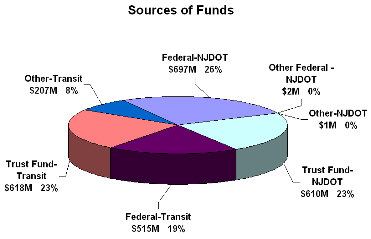Introduction
This document describes the transportation capital program for
the New Jersey Department of Transportation (NJDOT) and the New
Jersey Transit Corporation (NJ TRANSIT) for state Fiscal Year 2004,
which began on July 1, 2003.
This $2.65 billion program implements Governor McGreevey's "Smart
Growth" and "Fix-it-First" initiatives and pumps
more than $6 billion in direct economic benefits into the state's
economy.
The $1.34 billion Fiscal Year 2004 Capital Program for NJ TRANSIT
will cover eligible maintenance activities and other operating expenses,
pay debt service on projects that have been previously financed,
and continue construction of new light rail projects-leaving $521
million to address the fundamental needs of NJ TRANSIT's core system.
Despite these challenges, the NJ TRANSIT Capital Program will meet
all system safety requirements and mandates, and ensure system reliability
by maintaining a state of good repair for the rail network, bus
fleet, and maintenance facilities. The Corporation's Fiscal Year
2004 Capital Program continues to invest today in "Back to
Basics" priorities of safety, reliability and capacity, while
planning for tomorrow.
Program Highlights
- Invests nearly $300 million in improvements to New Jersey's
aging highway bridges.
- Begins implementation of NJDOT's new pavement management program,
with a range of highway rehabilitation, resurfacing, and preventive
maintenance projects.
- Begins implementation of NJDOT's new Safety First initiative.
The capital program includes $3.0 million for the first phase
of the Median Cross-over Crash Prevention Program and $1.0 million
for low-cost, fast-track safety projects under the Intersection
Improvement Program. Other Safety First programs will follow.
- Increases funding for pedestrian safety and targets it for
child safety-the Safe Streets to School program.
- Attacks congestion through providing $10.0 million for park-and-ride
projects, advancing Governor McGreevey's goal of adding 20,000
new spaces over the next five years. NJ TRANSIT will open 5,900
new parking spaces in FY04, including 1,500 spaces at Montclair
State University and 1,200 spaces on Route 17 in Ramsey. The NJ
TRANSIT Fiscal Year 2004 Capital Program includes funding to design
another 3,200 spaces.
- Funds a new Signs program for $10.0 million, the first phase
of a major overhaul of New Jersey's highway signs to make them
easier to read and follow.
- Increases funding for low-cost, fast-turnaround congestion
relief projects under the Fast Move program.
- Begins new "Intelligent Transportation System" work,
including engineering for tying together New Jersey's traffic
operations centers and for low-cost, fast-turnaround Smart Move
projects.
- Limits funding for new highways and highway widening projects
to 4% of the total program, in order to concentrate funding on
"fix-it-first" needs.
- Provides Freight funding that will support an $80 million public/private
partnership to improve rail freight access to Port Newark/Elizabeth
to help slow the increase of truck traffic on the state's highways
and preserve job growth in the competitive shipping industry.
- Increases funding for the Good Neighbor highway beautification
program from $1.0 million to $1.5 million, to pay for more plants,
shrubs, and trees along New Jersey's highways.
- Increases funding for the innovative Route 57 Corridor Scenic
Preservation project from $1.0 million in 2003 to $5.0 million
in 2004. This funding will allow local governments to preserve
key parcels as open space and prevent them from being converted
to sprawl development.
- Regarding state of good repair and reliability, the program
budget allots $222 million to replace 13 miles of track, install
53,000 new rail ties, improve as many as eight culverts, rehabilitate
drawbridge power systems and continue installation of the automatic
train control and positive train stop rail safety system. Funding
is also provided to continue refurbishment of existing equipment
(44 Comet II coach cars, each 15-20 years old, and mid-life overhaul
of transit buses).
- The FY04 Capital Program addresses safety with $103 million
on bridge and tunnel inspections, security improvements, Morris
& Essex Lines viaduct repairs, Federal Railroad Administration
mandates such as installation of emergency door releases and low-level
lighting, Americans-with-Disabilities-Act improvements at several
rail stations and environmental compliance.
- The FY04 Capital Program will deliver another investment in
Governor McGreevey's pledge of more seats on trains. The program
includes $172 million for the initial purchase of 100 bi-level
cars, the final delivery of 200 Comet V rail cars and initial
delivery of 33 new high-horsepower diesel locomotives that pull
longer trains. The new equipment will add nearly 30,000 additional
seats for our customers.
- Implementation of a High Density Interlocking Signal (HDIS)
system, adding 25 percent rail capacity between New Jersey and
New York.
- Aggressively advancing an environmental analysis for the Access
to the Region's Core (ARC) project. This project eventually could
double trans-Hudson access for rail passengers traveling between
New Jersey and New York. A new two-track tunnel beneath the Hudson
River and expanded passenger facilities in midtown Manhattan could
improve mobility, enhance security and spur economic development.
Financing our transportation needs
The Transportation Capital Program for Fiscal Year 2004 is funded
at a level of $2.65 billion. Of this amount, $1,309,687,752 is programmed
for use by NJDOT (49%) and $1,340,600,000 by NJ TRANSIT
(51 %). The NJDOT amount also includes Local Aid for counties and
municipalities.
The funding sources for this program are:
- New Jersey Transportation Trust Fund - $1,228,200,000
- Federal Highway Administration - $697 million (excluding $95
million "flexed" to NJ TRANSIT)
- Federal Transit Administration - $515 million (including $95
million "flexed" from NJDOT)
- Other sources - $207 million

The funding levels which have been identified for Fiscal Year 2004
and projected for future years are clearly inadequate to meet the
transportation needs of New Jersey in the first decade of the 21st
century.
With this in mind, Governor McGreevey, in his Executive Order Number
43, established a Blue Ribbon Transportation Commission "to
examine and make recommendations on the pressing transportation
issues facing New Jersey over the next ten years." The Commission
will "identify the means necessary to address these pressing
transportation issues and recommendations for their consideration
during the upcoming renewal of the Transportation Trust Fund."
|
